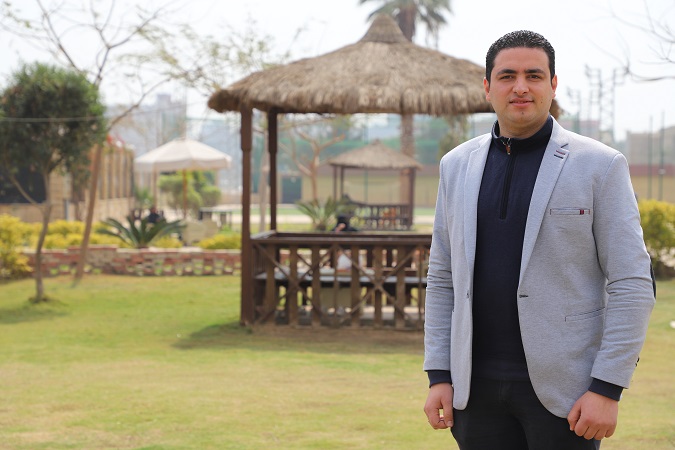Take Five: “Women can face situations and challenges, just like men.”
Date:

Fathy Taha, an EVAW volunteer in Imbaba. (Photo Credits: UN Women/ Nada Ismail)
Fathy Taha is a young man living near the marginalized area of Imbaba in Cairo, Egypt, where he volunteers for the Ending Violence against Women (EVAW) programme. Youth volunteers are one of the main active players in the programme, serving its objective of raising awareness of gender equality and women’s empowerment in communities. Volunteers use a variety of creative methods to raise awareness, such as interactive theater, sports days, art therapy and self-defense training.
UN Women sat down with Fathy to learn more about his experience with the programme and how it has impacted him and his surrounding community.
- Why did you join the EVAW programme?
My sister had joined the programme and I wanted to stop her from volunteering, because I was protective of her and I didn’t know the people she was dealing with in the programme or their background. However, I didn’t know why or how to tell her no, so I attended a session in order to get a better picture and I ended up signing as a volunteer at the end of the day. Now, I participate in activities even more than my sister.
- What made you change your mind about the programme?
I was convinced with the programme and wanted to join when I found out more about its important goals of ending violence against women and creating communities with gender equality. Some of us may be working to create change in our communities and develop them, but we don’t have the necessary tools. Through the programme, we found the right space and support to help us make a difference.
- How did the programme help change your relationship with your sisters?
I have 5 younger sisters and I had believed that they – and women, in general – could not be independent. If my sisters wanted to go anywhere or do anything, either my father, my brother or myself had to accompany them. I always linked their life with one of the men in the family. I didn’t see that a woman could be like a man and that women could deal with and solve any situation they are faced with independently. The programme has taught me that women can face situations and challenges, just like men. Now, I have much more trust in my sisters and I have confidence in their judgment, as well as their ability to be independent.
- What is the biggest challenge you face as a volunteer in the programme?
It is challenging to deal with people of different backgrounds and mentalities, to try and change their ideas and preconceptions that they have had for years. Despite this, we do see change happening through our work and we see people realizing that their habits are harmful. We see people start to change their behaviors. Even if a person only promises to change his/her behavior, then this is a success because they have at least realized that they are currently practicing a harmful behavior.
- What is the biggest change in your life after the programme?
I learned that as a volunteer, I am like the light and that there are many dark places in need of being lit. Nevertheless, before spreading our “light”, we need to first work on and develop ourselves. So, I worked on myself a lot in order to become a person who is suitable and able to raise awareness, to provide people with the help and awareness that they need.
***
The Ending Violence against Women (EVAW) programme is implemented by UN Women in partnership with The National Council for Women, the Ministry of Social Solidarity, CARE International in Egypt, and five local NGOs in the intervention areas, and with the generous support of USAID/Egypt.
Read in Arabic.